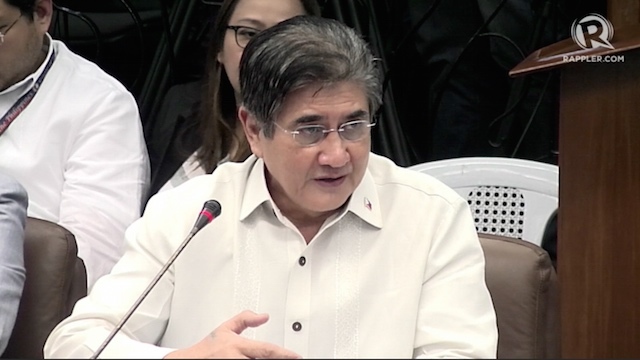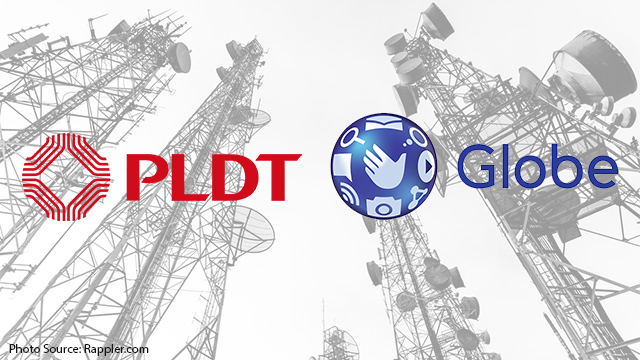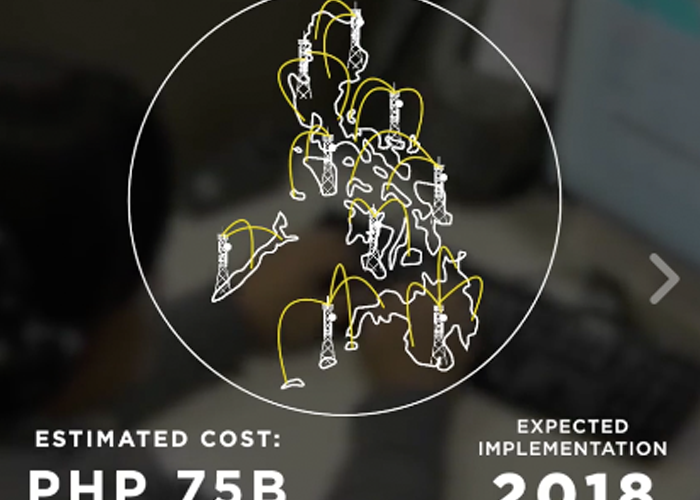DICT
Sen. Bam: Free internet in public places now a signature away from becoming law
The measure providing Filipinos free internet access in public places is now one signature away from becoming a law after the Senate ratified its final version Wednesday, Sen. Bam Aquino announced.
“Isang pirma na lang po at magiging batas na ito. This measure will empower Filipinos with internet access to education, information, jobs and business,” said Sen. Bam, the principal sponsor and co-author of the measure in the Senate in his capacity as chairman of the Committee on Science and Technology.
“We hope that this can be a step towards improving internet services in the Philippines, which, of course has become a main point for many of our countrymen,” he added.
The final version, which was also ratified by the House, will be submitted to Malacanang for President Duterte’s signature. If approved, this will be Sen. Bam’s 1st law in the 17th Congress and 18th in his four years as senator.
Sen. Bam hopes that internet service will improve with the successful implementation of the free internet access in public places, together with parallel efforts such as the National Broadband Plan and the entry of new players in the telecommunications industry.
“Let’s work together to achieve our goal of faster, cheaper, more reliable internet services for every Filipino,” said Sen. Bam.
Sen. Bam thanked co-authors Sens. Francis Pangilinan, Manny Pacquiao and Sen. Ralph Recto, co-sponsors Sen. Grace Poe and Recto and members of the Senate panel in the bicameral conference committee, including Sens. JV Ejercito, Nancy Binay, Joel Villanueva and Recto for helping develop and strengthen the measure.
The measure aims to provide internet access in all national and local government offices, public schools, public transport terminals, public hospitals and public libraries.
Under the measure, the Department of Information and Communications Technology (DICT) will be mandated to craft a plan and a timeline for the rollout of this program.
Sen. Bam: Gov’t, private sector no more excuses for poor Internet quality
With the imminent passage of the Free Internet in Public Places Act, the implementation of the Philippine Competition Act and the proposed National Broadband Plan (NBP), the government and the private sector will have the necessary platform to improve the country’s internet quality and access.
“We’re breaking down barriers to improving the Internet through our policies. Now, the ball is in the executive and private sector’s court,” said Sen. Bam Aquino, chairman of the Committee on Science and Technology. He also pushed the measure in the Senate as principal sponsor and co-author.
“Our hearings have exposed the lack of infrastructure that we have. So we’re reducing red tape for the private sector and we’re also allotting the necessary budget para ang gobyerno mismo ang mamuhunan sa internet infrastructure sa ibang lugar,” said Sen. Bam.
The senator said the challenge of implementation now falls on the shoulders of the Department of Information and Communications Technology (DICT) and the private sector.
“The DICT needs two-and-a-half years for the NBP while the sector needs to be opened up to new players to strengthen competition in the market,” said Sen. Bam.
The final version of the Free Internet in Public Places Act has been approved by the bicameral conference committee. After the final version is ratified by both houses of Congress, it will be transmitted to Malacanang for President Duterte’ signature.
Sen. Bam also believes that the Republic Act 10667 or the Philippine Competition Act will encourage the entry of more players in the telecommunications industry, leading to improved Internet service at affordable prices.
“The Philippine Competition Act will usher in such competition for the benefit of Filipino consumers for the long term,” said Sen. Bam, principal sponsor and co-author of Republic Act 10667 or the Philippine Competition Act
If finished quickly, the NBP can hasten the rollout of the implementation of the Free Internet Access in Public Places Act. It will be put up starting 2018 and expected to be fully operational by 2020.
Sen. Bam to DICT: Present approved nat’l broadband plan to stakeholders
With the approval of the national broadband plan, Sen. Bam Aquino called on the Department of Information and Communications Technology (DICT) to present it stakeholders, experts and other concerned groups for suggestion and scrutiny.
“Masaya tayo’t inaprubahan na ng pamahalaan ang national broadband plan na makatutulong upang mapaganda ang kalidad at mapalawak ang sakop ng internet sa bansa,” said Sen. Bam, chairman of the Committee on Science and Technology.
“Now that the plan is approved, we call on DICT to present it to stakeholders, experts and other concerned organizations for scrutiny and suggestion to ensure that it will be an effective one,” he added.
According to Sen. Bam, the committee will conduct a hearing where the DICT can provide details of the plan, which was approved by President Duterte during Monday’s 13th Cabinet meeting.
During last year’s committee hearing, Sen. Bam said the DICT presented three options to implement the P75-billion plan, including its preferred way of investing in Internet infrastructure, like fiber optic cables, especially in underserved and hard-to-reach areas.
Under this option, the government will also use the existing infrastructure of current players while encouraging new players to develop new Internet infrastructure.
The DICT is expected to come out with a final national broadband plan by the 2nd quarter of 2017. The project is expected to be finished in about 2 to 3 years.
Sen. Bam is the principal sponsor of Senate Bill No. 1277 or the Free Internet Access in Public Places Act, which is being currently tackled in the plenary.
If enacted into law, free internet access will be provided in all national and local government offices, public schools, public transport terminals, public hospitals and public libraries.
Sen. Bam’s Senate Bill No. 1050 is included in Senate Bill No. 1277. It seeks to connect all public educational institutions to the internet to help students enhance their personal and academic development.
Bam pushes for greater internet access and free internet in public places
A measure providing free internet connectivity in public places and improving internet access across the Philippines is now closer to becoming a law, according to its main proponent, Sen. Bam Aquino.
Sen. Bam said Senate Bill No. 1277 or the Free Internet Access in Public Places Act passed the committee level and is slated for plenary deliberations.
According to Sen. Bam, chairman of the Committees on Education and Science and Technology, free internet access will be provided in all national and local government offices, public schools, public transport terminals, public hospitals and public libraries.
“It is imperative that we institutionalize this very important platform – to improve access to quality Internet in the Philippines especially when only 52.6% of Filipinos have Internet access,” said Sen. Bam.
Under the measure, the Department of Information and Communications Technology (DICT) will be mandated to craft a plan and a timeline for the rollout of this program.
“The DICT will also take the lead in coordinating with local government units to ensure the on-ground implementation of the program,” said Sen. Bam in his sponsorship speech.
The measure will also authorize the DICT to streamline the process for the application of permits and certificates for the construction of infrastructure and installation of equipment necessary, in coordination with national government agencies and local government units.
“Now is the time to invest completely in developing internet quality and bringing this powerful tool to every port, every station, every park, every museum, and every classroom in the Philippines,” Sen. Bam stressed.
As chairman of the Committee on Education, Sen. Bam has filed Senate Bill No. 1050 seeking to connect all public educational institutions to the internet to help students enhance their personal and academic development.
In a previous hearing, it was discovered that only 26 percent of public schools in the country have Internet access, which is detrimental to the progress of education.
Sponsorship Speech: An Act Establishing Free Internet Access in Public Places Act
Senator Paolo Benigno “Bam” A. Aquino IV
17th Congress, Senate of the Philippines
Sponsorship Speech, December 14, 2016
Good afternoon, Mr. President and esteemed colleagues! Mga kaibigan at mga kababayan, magandang hapon sa ating lahat.
Today, it is an honor to address you, Mr. President and distinguished colleagues, to sponsor an audacious policy that will enable us to leapfrog Internet access in the Philippines.
I stand before you to sponsor Senate Bill No. 1277 in substitution of S.B. Nos. 58, 190, 816, and 1050, entitled “An Act Establishing The Free Internet Access Program In Public Spaces In The Country And Appropriating Funds Thereof, otherwise known as “Free Internet Access in Public Places Act” which seeks to install free internet access points in public places all throughout the country.
—
Friends, meet Jose.
Jose wishes to escape the city and travel the entire Philippines to discover with his own eyes the wonders of our country.
Jose will not let work stop him. He can work remotely and send his reports via email.
Jose won’t even let his girlfriend stop him. They can always message one another and even go on video-call dates while he is away.
All Jose is waiting for is for, Mr. President, is for Internet in the Philippines to be available in every island, mountain, and valley.
—
Mr. President, napaka importante ng internet sa buhay natin.
Para kay Jose, ito’y importante para makapaglibot sa Pilipinas, mag-post ng mga selfie sa Mayon, magtrabaho mula sa kubo, at makipag-online date sa gitna ng mangrove sa Palawan.
Para sa iba nating kababayan, ito’y mahalaga para makausap at humingi ng payo mula sa amang nagtatrabaho sa Saudi.
Para sa mga call center agent, ang internet ang nag-uugnay sa kanila at kanilang mga kausap abroad.
Para sa mga freelancers, ito’y kailangan para makausap ng maayos ang kliente at mapadala ang hinihinging trabaho.
Para sa mga negosyanteng Pinoy, ito’y nagagamit sa pagbebenta ng gamit o paghahanap ng mga bagong supply.
Para sa maraming unemployed, ito’y importante para makapag-apply sa mas maraming trabaho online.
Para sa mga guro at mag-aaral, ang internet ang pinanggagalingan ng research, ng learning materials, at modules.
And yet, Mr. President, only about 52.6% of Filipinos have access to Internet services (ITU).
Compared to our neighbors, we are clearly lagging behind in Internet access. The same study shows that 81.3% of Singaporeans, 68% of Malaysians and 60.1% of Thais can access the Internet.
For this reason, Mr. President and distinguished colleagues, it is imperative that we institutionalize this very important platform – to improve access to quality Internet in the Philippines and provide free internet connectivity in public spaces.
The Free Internet Access in Public Places Act mandates the establishment of the necessary infrastructure, equipment, and end-user platform needed to give all Filipinos free internet access in public spaces.
Under this act, all national and local government offices, public schools – from elementary to tertiary – public transport terminals, public hospitals, and public libraries will have free internet access.
The Department of Information and Communications Technology (DICT) shall be charged with developing a plan and a timeline for the rollout of this program. They shall also take the lead in coordinating with local government units to ensure the on-ground implementation of the program.
Most importantly, the DICT shall be authorized to streamline the process for the application of permits and certificates for the construction of infrastructure and installation of equipment necessary – a major hurdle faced by companies seeking to build internet infrastructure.
To address this, national government agencies and local government units will also have the responsibility of coordinating with the DICT and DILG to fast-track these permits and certificates necessary for the program’s roll-out.
They shall also be in charge of maintaining and safeguarding the program and its equipment with a designated on-site coordinator.
Offering Filipinos free high-quality internet access in public places is going to revolutionize the way that we go about our day and open our minds to boundless possibilities for how we can make our lives, our families, and our communities better.
Mr. President, noong ako’y napuntang Bacolod, bumisita po ako sa Alegria Elementary School kung saan nakilala ko si Baryeth. Siya’y Grade 6 student na miyembro rin ng student council.
Ang request po niya sakin: sana mayroon na silang internet connection sa paaralan para magawa nila ng mabilis at maayos ang kanilang mga school project.
Mr. President, 26% lang ng ating mga public schools ang may access sa internet at karamihan pa sa mga paaralang mayroong internet ay nagtiyatiyaga sa mga USB dongle.
Mr. President, distinguished colleagues, now is the time to invest completely in developing internet quality and bringing this powerful tool to every port, every station, every park, every museum, and every classroom in the Philippines.
Imagine tourist sites with free Internet access, where travelers from here and abroad can read up on historical sites and post beautiful photos of our country on social media.
Imagine museums with free WIFI and downloadable applications so visitors can learn more about our arts and culture.
Imagine strolling through a public park and connecting to free Internet so you don’t have to worry about whether you’re missing out on important emails.
Imagine getting last-minute work done at an airport or seaport while waiting to go on your next adventure.
And imagine hundreds of state universities and thousands of public schools with access to world-class learning materials and educational videos, making the most out of the World Wide Web to enhance learning.
Kung hindi po ngayon, kailan pa? Ang internet ay maaaring maging susi sa pag-unlad ng bawat Pilipino – at susi sa pagtupad ng Philippine travel dreams ni Jose.
Let’s pass the Free Internet in Public Places Act and arm Filipinos with the power of connectivity, the power of information, and the power of education!
Bam calls on local and int’l players to work with the DICT for better Internet
Sen. Bam calls on Internet companies here and abroad to work with the DICT to improve the quality of internet services in the Philippines.
“The success of our National Broadband Plan to improve Internet services lies in strong partnerships between government and the private sector,” said Sen. Bam after leading the Committee on Science and Technology’s hearing that looked into the initial details of the government’s national broadband plan Tuesday.
During the hearing, the Department of Information and Communications Technology (DICT) revealed initial details of its P75-billion national broadband plan, which is implementable in about 2 to 3 years.
The DICT stated that their preferred option is to invest in Internet infrastructure, like fiber optic cables, especially in underserved and hard-to-reach areas.
Under this option, the government will also use the existing infrastructure of current players while encouraging new entrants to develop new Internet infrastructure.
According to Sen. Bam, the DICT will come out with a final national broadband plan by the 2nd quarter of 2017.
“Kapag maayos ang pagkagawa ng plano at siguraduhin na maayos ang pag-implement nito, magkakaroon tayo ng sapat na imprastraktura para tumaas ang kalidad ng internet at bumaba pa ang presyo nito,” said Sen. Bam.
On top of the national broadband plan, Sen. Bam said the recently passed Philippine Competition Act will help create a climate that will attract foreign players to partner with Filipino companies, while the Free Internet Access in Public Spaces bill includes a provision to cut red tape for permits.
“The policies we’re working on will also create a more competitive environment and promote ease of doing business to make it easier for new players to come,” added Sen. Bam.
Bam: LGUs open to fast tracking permits for cell sites, IT infrastructure
Are you amenable to fast tracking permits for Internet infrastructure?
Senator Bam Aquino threw this challenge to local government units (LGUs), which are being blamed for the slow and tedious issuing of permits to build the cell sites needed to improve internet quality in the country.
“If we include provisions on fast tracking cell site construction, how would the LGUs feel about that?” Sen. Bam asked during the Senate hearing on proposal to grant President Duterte emergency powers to solve the worsening traffic problem in the country.
“If in the emergency powers bill, in an Executive Order, or in the Free Wi-Fi Bill, nakalagay doon na within one month, the cities must choose specific areas for cell site applications, would you be amenable?” Sen. Bam asked Quezon City Mayor Herbert Bautista, Calamba City Mayor Justin Marc Chipeco and representatives from Manila and Pasay.
“Opo. In fact, we also want that dahil iyan ang hinihingi ng mga kababayan namin, magiging expeditious din ang mga proyekto at the same time, iyong access the communication mabilis din,” said Mayor Bautista.
However, Bautista said they can only fast track the process for government-owned properties and not on private properties, such as subdivisions, which must go through the regular process of permit approval.
“We fully support that proposal. Kaya po iyon,” said Manila City administrator Atty. Ericson Alcovendaz.
“We support that initiative. Information Technology (IT) has a significant footprint on the solution [to traffic]. If we can make less people go out on the streets and work from home, so much the better,” stressed Pasay City administrator Dennis Acorda.
Chipeco, for his part, supports the proposal as he sees the need to improve Internet speed because it is a necessity, more than a luxury.
In an earlier hearing conducted by Sen. Bam as chairman of the Committee on Science and Technology, the Department of Information and Communications Technology (DICT) and telecommunication companies complained about difficulty in acquiring permits from LGUS for their infrastructure development efforts.
Bam: Unacceptable that only 26 percent of public schools have Internet connection
Only 26 percent of public schools in the country have Internet access, which is detrimental to students’ competitiveness, according to the Department of Education (DepEd).
DepEd Undersecretary Alain Pascua made this revelation during the Committee on Education hearing on the status of Internet connectivity in public schools all over the country.
According to Pascua, the data is worrisome since DepEd considers connectivity as one of the important tools in learning.
“Nakakabahala sa akin na sa report ng Department of Education (DepEd) na 26 percent ng ating eskuwelahan ay may Internet connectivity,” said Sen. Bam, chairman of the Committee on Education.
“And to think, may bilyun-bilyong piso silang budget para i-connect ang ating mga eskuwelahan sa Internet, only about one-fourth lang ang may kakayahang mag-connect dahil sa kakulangan sa infrastructure at Internet signal,” Sen. Bam added.
With this, Sen. Bam urged the DepEd, Department of Information and Communications (DICT) and telecommunication companies to map out a plan that will address the problem.
This way, public schools and state colleges and universities will be included in the roll-out of the government’s free Wi-Fi project all over the country in the next two years.
“Kung ang mga eskuwelahan natin hindi maka-connect sa Internet, kaagad-agad, hindi na sila competitive gaya ng ibang eskuwelahan dito at sa buong mundo,” said Sen. Bam.
By allowing Internet connectivity in schools, Sen. Bam stressed that it will pave the way for our public educational system to be taken to the future.
“Gusto naming makita ang roadmap kung paano ang 26 percent, magiging 100 at kung ilang taon bago ma-fulfill ang ating goal,” the senator explained.
Sen. Bam pointed out that public schools need reliable Internet connection to support and enhance the learning capabilities of students by giving them access to learning materials and online information.
As chairman of the Committee on Science and Technology, Sen. Bam also discussed several bills seeking to establish free Wi-Fi to public places in different parts of the country.
The DICT said it is planning to put up free Wi-Fi in 12,841 public areas in different parts of the country by November 2017.
However, the DICT and telecommunication companies difficulty in acquiring permits from local government units (LGUs) are hampering their infrastructure development efforts.
“We want to make sure na ang mga balakid na ito, matanggal na para magkaroon tayo ng free Wi-Fi,” said Sen. Bam.
Bam pushes for free Internet in all public schools
Believing that high-quality Internet is a crucial necessity in today’s learning environment, a senator wants to establish free Wi-Fi hotspots in all public schools to help students enhance their personal and academic development.
Sen. Bam Aquino’s Senate Bill No. 1050 seeks to establish an Internet Access Program in all public schools in the country, including State Universities and Colleges.
“Teachers and students should be given access to the Internet for meaningful research, collaboration, and learning,” said Sen. Bam, chairman of the Committee on Education, Arts and Culture in the 17th Congress.
Instead of discouraging Internet use at schools, Sen. Bam said students must be trained to engage with World Wide Web in a responsible way that furthers their personal and academic development
Under the measure, the newly-established Department of Information and Communications Technology (DICT) will be tasked to ensure that all public schools provide reliable Internet connection to students, faculty members and other non-teaching personal.
According to Sen. Bam, this Internet connection must be put up in publicly accessible areas on the premises.
As chairman of the Senate Committee on Trade, Commerce and Entrepreneurship in the 16th Congress, Sen. Bam spearheaded the investigation into the slow and expensive Internet connection in the country.




Recent Comments